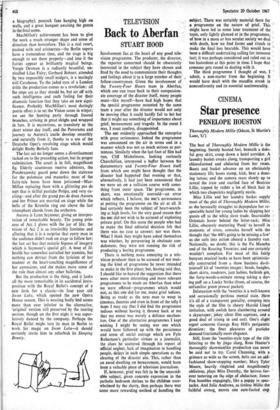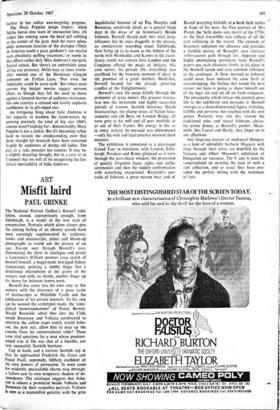CINEMA
Star presence
PENELOPE HOUSTON
The best of Thoroughly Modern Millie is the beginning. Sternly booted feet, beneath a dole- ful grey skirt, creep down a hotel corridor. A laundry basket creaks along, transporting a girl chloroformed and abducted from her room. Boots and basket advance on an obstinately stationary lift; boots stamp, kick, beat a danc- ing tattoo; and the camera rears slowly up to reveal the irate and startled face of Beatrice Lillie, topped by rather a lot of black hair in which two chopsticks negligently nestle.
Miss Lillie and her laundry basket supply most of the plot of Thoroughly Modern Millie, as she heroically struggles to depopulate her re- spectable hotel for young ladies by shipping her guests off to the white slave trade. Inscrutable Orientals hover behind the letter-rack; Miss Lillie, obscurely muttering Took' to herself in moments of stress, consoles herself with the thought that 'the 400's going to be missing a few' as she sails into action aboard a laundry van. Notionally, no doubt, this is the Fu Manchu end of the Roaring Twenties; and one certainly wouldn't complain. For most of this fairly buoyant musical looks to have been optimistic- ally constructed from a show business do-it- yourself kit of 'twenties images: beads, bangles, short skirts, roadsters, jazz babies, bathtub gin, the forty-words-a-minute stenog taking a dar- ing puff on a Lucky Strike (from, of course, the unfamiliar green prewar packet).
Infatuation with the 'twenties is a well-known and occasionally perilous mental state. Here it's all of a transparent geniality, creeping into the style of the film (a cheery Harold Lloyd imitation, with owlish hero clambering around a skyscraper; jokey silent film captions, and a good deal of irising in and out). One's slight regret concerns George Roy Hill's peripatetic direction: the finer pleasures of pastiche demand fractionally more elegance.
Still, from the 'twenties-style type of the title lettering to the by jingo slang, Ross Hunter's thoroughly showmanlike production can never be said not to try. Carol Channing, with a grimace as wide as the screen, belts out an old- fashioned show-stopping number; Mary Tyler Moore, heavily ringleted and magnificently oblivious, plays Miss Dorothy, the heiress for- ever teetering on the edge of abduction; James Fox bumbles engagingly, like a puppy in spec- tacles. And Julie Andrews, as tireless Millie the faithful stenog, moves one sure-footed step
further in her rather awe-inspiring progress.
'Ilse Mary Poppins image lingers: when Millie bursts into tears of unrequited love, it's rather like coming upon the head girl sobbing in the corner of the gym. And the more splen- didly conscious fatuities of the dialogue ('Only in America could a poor gardener's son receive such absolutely spiffing treatment,' or words to that effect) rather defy Miss Andrews's energetic frontal attack. But there's an undeniable sense of big star presence. Millie may at times irresis- tibly remind one of the Hermione Gingold comment on Evelyn Laye, 'Not even the Admiralty could be more arch.' But where most current .big budget movies suggest nervous effort, as though they felt the need to shove against a lumpish barrier of audience resistance, this one conveys a relaxed and faintly euphoric confidence in its gilt-edged star.
An intriguing thing about Julie Andrews is her capacity to madden the trend-noters, by seeming precisely the kind of big star 1960's cinema wasn't looking for: demonstrably, Mary Poppins is not a junkie. But it's becoming rather hard to sustain the condescending view that three straight hit musicals have been sustained largely by audiences of doting old ladies. The star, as a rule, prebedes her context. It may be a slightly daunting thought, but in a year or so I suspect that we will all be recognising the his- torical inevitability of Julie Andrews.



































 Previous page
Previous page